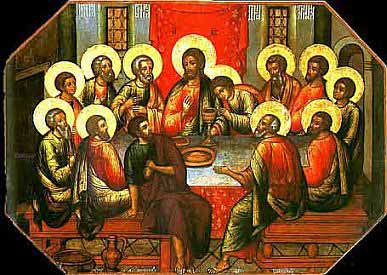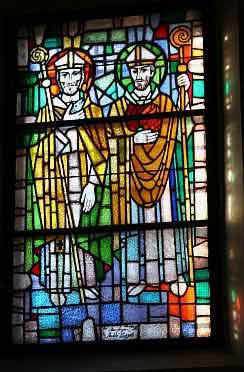Do Catholics Worship the Blessed Virgin Mary?
Misconception: Catholics worship Mary.
True Catholic Teaching: Catholics do not worship Mary. God ordered His people in the Ten Commandments to worship Him alone. Catholics only worship the one, true God in His three persons: Father, Son, and Holy Spirit. Jesus is the second part of the Holy Trinity. He is the Word of God made flesh
(John 1:14). He is God.
Since Jesus is God and His mother is Mary, Catholics call Mary the “Mother of God”. This does not mean that we think Mary made God or came before God. Instead it is testimony to the truth that Mary is the mother of the part of God that became human – Jesus.
The Catholic Church teaches that God specifically chose Mary out of all the women in the world to be the mother of Jesus. In the Gospel of Luke the angel Gabriel visits Mary to announce His coming and says,”Hail, favored one! The Lord is with you.” Catholics believe that just as Mary’s virgin body was kept pure in preparation for Jesus, that her soul also was kept free from the stain of sin.
When it comes to the Catholic Church’s teaching on Mary, many of our non-Catholic brothers and sisters find the position Catholics hold regarding Mary difficult to accept. Namely, the Immaculate Conception, Mary as “Mother of God”, and the Assumption of Mary into Heaven and her Coronation as Queen. However, this difficulty mainly stems from a lack of understanding.
The Catholic Church firmly believes that Mary was immaculately conceived. Since God rejects all sin, and the purpose of Christ’s incarnation was to release man from the grasp of Satan, it was not suitable that our redeemer be personally associated with sin. This means that unlike the original sin that we as humans inherit at the moment of conception, Mary was exempt from this sin, and in like manner, was not subject to sin throughout her life.
In
Luke 1:28, The Angel Gabriel addresses Mary “Hail, full of grace!” The fullness of grace would not have been hers, had she any stain of sin. In the Apostolic Constitution by Pope Pius IX on the Immaculate Conception, he iterates this teaching:
“Above all creatures did God so loved her that truly in her was the Father well pleased with singular delight. Therefore, far above all the angels and all the saints so wondrously did God endow her with the abundance of all heavenly gifts poured from the treasury of his divinity that this mother, ever absolutely free of all stain of sin, all fair and perfect, would possess that fullness of holy innocence and sanctity than which, under God, one cannot even imagine anything greater, and which, outside of God, no mind can succeed in comprehending fully.”
The Catholic Church commemorates Mary’s Immaculate Conception on December 8th of each year.
As we read the gospels, we see unmistakably that Mary is the Mother of Jesus. In the Angel Gabriel’s greeting to Mary, he confirms that she will bear the Son of God. In the profession of faith we recite at each Sunday Mass, we proclaim that Jesus is the second person of the Trinity, that He is “true God from true God”. Therefore, if Jesus is God, we must gather that Mary, the one who gave birth to, and nurtured Jesus, is the mother of God who became Man – Jesus. There is no other human to whom Jesus was as closely and intimately connected, as His Mother, Mary.
The Catholic Church relies heavily on sacred tradition, as passed down from the apostles, and manifested in the teaching authority of the Church. The assumption of Mary is one doctrine of the Church that has emerged from apostolic tradition, rather than directly from scripture. It is not officially declared whether or not Mary underwent human death. However, what the Church does officially pronounce is that after the course of her earthly life, Mary was assumed body and soul into heaven by the power of God. The Church’s belief that Mary’s soul was perfectly sinless gives us confidence that she went directly to God. At the same time, her body was not subject to corruption, as our human bodies typically are. There is biblical history of one who is so close to God, being assumed body and soul into heaven. In the Old Testament, we see that Elijah was assumed into heaven in a whirlwind. (2 Kings 2:11). Similarly we read in Hebrews 11:5, “By faith Enoch was taken up so that he would not see death; and he was not found because God took him up; for he obtained the witness that before his being taken up he was pleasing to God.” Mary was even closer to God than these two biblical figures, and therefore this special privilege of bodily assumption was granted to her. The feast of Mary’s Assumption is celebrated on August 15th of each year.
Mary’s body has been glorified in heaven and she has been given an important role near her Son as Queen of Heaven and Earth. Mary is entitled “queen” because she is the Mother of Jesus, who is truly a King of kings. With the queenship Mary has been given by her Son, Mary offers abiding mercy and compassion, interceding for all of God’s children. In the book of Revelation 12:1, Mary’s status as queen is reflected, “and a great portent appeared in heaven, a woman clothed with the sun, with the moon under her feet, and on her head a crown of twelve stars.” The feast of Mary’s queenship is celebrated on August 22nd of each year.
Mary has been given an extraordinary role in the history of salvation. In response to her special status, Catholics give Mary unequaled admiration and respect, greater than any other saint. This is a tradition often misunderstood by non-Catholics. The honor we give to Mary is not to be compared to the worship and praise we give only to Almighty God. However, Mary must not be disregarded, as she offers many graces, and mercy to all who call upon her intercession.
For more information regarding the Dogma of the Assumption and Coronation of Mary, please view the official Church document at the following link:
http://www.vatican.va/holy_father/pius_xii/apost_constitutions/documents/hf_p-xii_apc_19501101_munificentissimus-deus_en.html
Source:
http://whycatholicsdothat.com/the-blessed-virgin-mary/


 So he left his church and took about 50 people in his congregation with him.
So he left his church and took about 50 people in his congregation with him.  Oh, and because he was married, he became a deacon, not a priest.
Oh, and because he was married, he became a deacon, not a priest.



